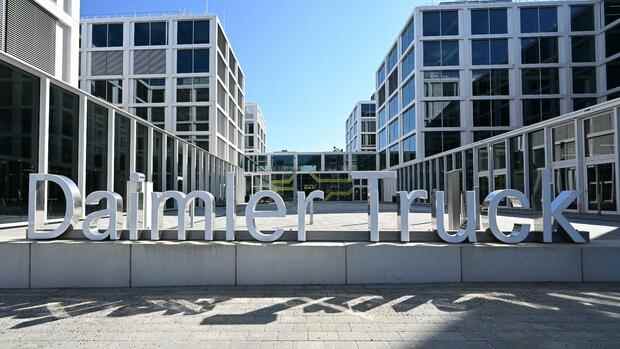The adjusted return on sales should therefore increase to seven to nine percent for the year as a whole.
(Photo: dpa)
Munich Strict cost discipline and the largest price increase in history bring Daimler Truck good results. The world’s largest manufacturer of trucks and buses was able to increase its sales by more than a fifth to 10.5 billion euros in the first quarter. At the same time, the operating profit adjusted for special effects increased to 651 million euros. This corresponds to an increase of eleven percent. The order backlog reaches a new record high.
“Our positive results in the first quarter show that we are able to stay on course, even in the face of fluctuating general conditions,” explained Jochen Götz, CFO of Daimler Truck. In view of the Ukraine war, increased raw material costs and a lack of semiconductors, it is more important than ever to secure liquidity and reduce fixed costs. “We’re not letting up a bit here,” explained Götz.
The Dax group is looking forward with hope and is raising its forecast slightly. The commercial vehicle manufacturer is now assuming sales for the year as a whole of 48 to 50 billion euros. The company had previously promised a maximum of 47.5 billion. In terms of operating profit (EBIT), instead of a slight decline, Daimler Truck is now expecting earnings to be at the level of the previous year, i.e. around 3.4 billion euros.
There are two main reasons for the better view. On the one hand, Daimler Truck benefits from positive exchange rate effects. The group traditionally generates well over half of its profits in North America. The Swabians are now benefiting from the currently strong dollar exchange rate. More important, however, is improved price enforcement. The group recently raised the prices for its semi-trailers by an estimated five percent – more than ever before.
Top jobs of the day
Find the best jobs now and
be notified by email.
Customers swallow these surcharges without much grumbling, because many forwarders are happy if they get a new vehicle at all in view of the lack of chips. On average, customers currently have to wait eight to nine months for an articulated lorry. As a result, there are hardly any cancellations, if at all. Thanks to the higher prices, Daimler Truck can more than compensate for negative effects such as the sharp rise in the cost of raw materials such as steel.
There is still a lot of room for improvement in the margin
The adjusted return on sales should therefore increase to seven to nine percent for the year as a whole. In the previous year, Daimler Truck only managed a margin of 6.1 percent; in the first quarter it was 5.9 percent. This shows that there is still a lot of room for improvement. In terms of profitability, the Swabians are still lagging behind their most important competitors. For example, Volvo Trucks posted a return on sales of twelve percent in the first quarter; Paccar even managed 12.6 percent.
In North America, Daimler Truck achieves similarly good values. The biggest problems are currently the loss-making bus business and weakening sales in Asia. Viewed globally, the group was able to increase its truck sales by eight percent to 109,000 vehicles in the first quarter. In the Asia region, however, sales shrank by six percent, and the adjusted operating result collapsed by almost half.
Due to the still sluggish business with touring coaches, Daimler also posted another loss in its bus division. At minus 45 million euros, this was at least 40 percent lower than a year earlier. The development in Europe, on the other hand, is pleasing. Here, the group, with its core brand Mercedes-Benz, was able to almost double its operating profit to 342 million euros.
In Russia, on the other hand, Daimler Truck had to write off a good 170 million euros. Another 30 million in allowances will be added in the coming months. The reason: Like many other Western companies, Daimler Trucks frozen all of its business activities in Russia after the outbreak of the Ukraine war. In addition, the Swabians want to end their controversial cooperation with the Russian armored car manufacturer Kamaz as soon as possible.
More: VW subsidiary MAN relies on purely electric trucks for long-distance journeys.
